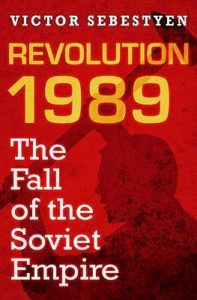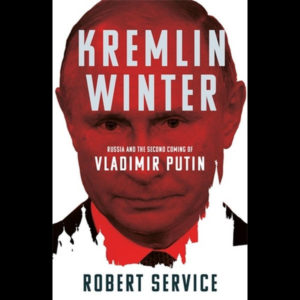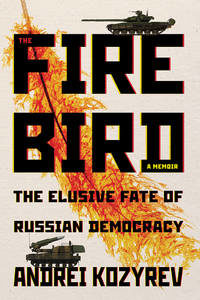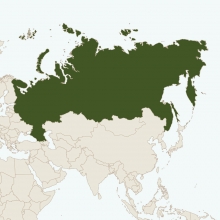Barring a few notable exceptions, the consensus among the commentariat over the past few years — at least in the US and Britain — portrays Vladimir Putin as a mastermind who runs rings around “western” leaders, notes Victor Sebestyen, the author of ‘Revolution 1989: The Fall of the Soviet Empire’.
 He might be bad, the argument goes, but Russian trains run on time and with the travails facing liberal democracies, the canny operator in the Kremlin triumphs over the west as he is doing in the Middle East, resetting the geopolitical map. Putin, by comparison with so many western leaders, has been a huge success. Really? he asks in a Financial Times review of Kremlin Winter: Russia and the Second Coming of Vladimir Putin, by Robert Service:
He might be bad, the argument goes, but Russian trains run on time and with the travails facing liberal democracies, the canny operator in the Kremlin triumphs over the west as he is doing in the Middle East, resetting the geopolitical map. Putin, by comparison with so many western leaders, has been a huge success. Really? he asks in a Financial Times review of Kremlin Winter: Russia and the Second Coming of Vladimir Putin, by Robert Service:
It takes the biographer of Lenin, Stalin, Trotsky and Tsar Nicholas II to offer a broader perspective and place Putin in the great sweep of Russian history, where judgment will surely be less kind to the man who has ruled Russia since the first day of the 21st century (and counting). ….Putin’s “success” is how he retains and exercises power — Russia’s eternal question, as Lenin framed it: “Who, whom?” (Who has power, and for whom?) This is where Service, Britain’s foremost historian of modern Russia, is at his most acute. He describes with telling detail how Putin turned a one-party state into a one-clique state. The president’s former KGB cronies, the siloviki, run the bureaucracy and the oligarchs who stole the Russian state in the most epic example of grand larceny in history support him. Service fills in plenty of new material about how the kleptocrats around Putin have made his family vastly rich.
 On coming to power, Putin set about restricting the freedoms that Russian media enjoyed under Yeltsin, notes analyst Maria Lipman. After the protests of 2011–12, even the smaller-audience media that still pursued editorial independence came under pressure. Recently, a rise in civic activism and the rapid expansion of internet technologies have brought a new vibrancy – although non-government media remain powerless before the Kremlin’s political monopoly, she writes for Eurozine, a partner of the National Endowment for Democracy.
On coming to power, Putin set about restricting the freedoms that Russian media enjoyed under Yeltsin, notes analyst Maria Lipman. After the protests of 2011–12, even the smaller-audience media that still pursued editorial independence came under pressure. Recently, a rise in civic activism and the rapid expansion of internet technologies have brought a new vibrancy – although non-government media remain powerless before the Kremlin’s political monopoly, she writes for Eurozine, a partner of the National Endowment for Democracy.
“Service has written widely about revolutions. He knows that when regime change occurs in Russia, it happens with extraordinary speed and at an unpredictable time,” Sebestyen adds. “It may seem highly unlikely today, but in the revolutionary age we are in now, stability is a fragile thing. It would be foolish to discount a world without Putin — and soon.” RTWT
 Andrei Kozyrev, author of Firebird: The Elusive Fate of Russian Democracy, did not defect or openly join other dissidents such as Andrei Sakharov, but he looked for ways to reform the USSR from within and push it toward democracy and economic freedom, notes Walter Clemens, an Associate of Harvard University Davis Center for Russian and Eurasian Studies:
Andrei Kozyrev, author of Firebird: The Elusive Fate of Russian Democracy, did not defect or openly join other dissidents such as Andrei Sakharov, but he looked for ways to reform the USSR from within and push it toward democracy and economic freedom, notes Walter Clemens, an Associate of Harvard University Davis Center for Russian and Eurasian Studies:
In Russian folklore the Firebird [zhar-ptitsa] is a beautiful creature that can bring happiness if caught, despite presenting huge challenges to its captor. Kozyrev says that he has chased his own Firebird, believing that sooner or later the Russian people would discover the road to democracy and cooperative foreign relations.

National Democratic Institute
“I first met Russian Foreign Minister Andrei Kozyrev in 1990, when the Soviet Union still had a foreign minister of its own, Eduard Shevardnadze,” Michael McFaul writes in the book’s Foreword. “I was part of an American delegation in Moscow that was conducting a workshop on democracy on behalf of the National Democratic Institute,* so we decided to pay a courtesy call to this newly appointed official in Boris Yeltsin’s government….”
Wilson Center NOW speaks with Kozyrev, former Foreign Minister of the Russian Federation, about his new book (above). Kozyrev provides an eyewitness account of the collapse of the Soviet Union, the struggle to create a democratic Russia under Yeltsin, and how this critical period eventually allowed the rise of crony capitalism and Vladimir Putin.
*A core partner of the National Endowment for Democracy.







